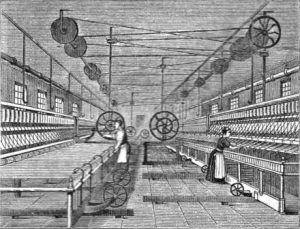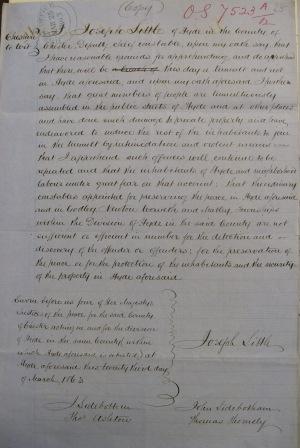
Spinning mules from Chambers’ ‘Information for the People’ 1856
A century and a half ago, the American Civil War was well under way, and its devastating consequences for that country are well-known. But the conflict had serious repercussions on this side of the Atlantic, too. The cotton industry in north west England was dependent on supplies of raw cotton from the southern states, and when this supply was interrupted there was real hardship in some places.
This led to the fear of civil disturbances in some towns, including Hyde in Cheshire, where the authorities were sufficiently concerned to swear in a number of special constables to keep the peace. This document (Ref HO 45/7523) comes from the treasure trove that is Home Office Registered Papers 1839-1979, series containing more than 26,000 boxes and files.
I Joseph Little of Hyde in the County of Cheshire, Deputy chief constable, upon my oath, do say that I have reasonable grounds for apprehending and do apprehend that there will be this day a tumult and riot in Hyde aforesaid; and upon my oath aforesaid I further say that great numbers of people are tumultuously assembled in the public streets of Hyde and at other places and have done much damage to private property and have endeavoured to induce the rest of the inhabitants to join in the tumult by intimidation and violent means that I apprehend such offences will continue to be repeated and that the inhabitants of Hyde and neighbourhood labour under grat fear on that account; that the ordinary constables appointed for preserving the peace in Hyde aforesaid and in Godley, Newton, Werneth and Matley Townships wityhin the division of Hyde in the said County are not sufficient of efficient in number for the detection and discovery of the offender or offenders, for the preservation of the peace or for the protection of the inhabitantsand the security of the property in Hyde aforesaid.
Sworn before us four of Her Majesty’s Justices of the Peace for the said County of Chester acting in and for the division of Hyde aforesaid this twenty third day of March 1863. Joseph Little
J Sidebottom Thos Ashton John Sidebotham Thomas Thornely
The document goes on to give the names of the special constables that were sworn in. In some cases it has been possible to identify the individuals in the 1861 census, so I have added their occupations where I am reasonably certain I have identified the right man. I hasten to point out that this is not the result of lengthy and painstaking research, and falls well short of the Genealogical Proof Standard! I thought it was worth doing, however, just to illustrate the possibilities for building up a picture of a community from a variety of sources.
- Sampson Ardern, tailor and draper
- Arthur Aspland, cotton spinner & manufacturer
- William Baker
- John Barlow
- Robert Bell, linen draper
- Frank Bowker, labourer
- John Bradbury
- Cliff Broadbent
- James Brocklehurst, druggist
- Richard Burch, gasfitter, engraving tinplate worker (employer)
- James Butterworth, commercial clerk
- George Dunn Caley, solicitor’s clerk
- James Cheetham
- John Cheetham
- Charles Coburn
- Beriah Cooper, linen draper
- Jacob Fletcher Crompton, commercial clerk
- John Crook
- Samuel Davenport, grocer’s shopman
- William Davy
- John Detheridge
- William Detheridge, joiner
- Samuel Fletcher, cotton weaver
- Thomas France
- Joseph Goodfellow
- Simeon Goodfellow, machine turner
- Joseph Goodwin, bricksetter’s labourer
- Joseph Green
- William Hampson, felt hatter
- John Handford, grocer
- Thomas Ferns Handford, cotton spinner, grocer & corn dealer
- John Harrowhill, carpenter
- Alexander Thornely Hibbert, cotton mill manager
- Charles Hibbert, cotton mill manager
- Edward Hibbert, living on interest
- Frank Hibbert
- Henry Hibbert, cotton stripper
- James Hibbert, engine driver cotton mill
- John Hibbert
- William Henry Hibbert, mechanic
- Matthew Hurst
- Thomas Johnson
- Thomas Lawton, grocer & corn dealer
- Joseph Leah, cotton weaver
- Samuel Leather, manager gas works
- William Mackay
- Ebenezer Marshall, mechanic’s fitter
- John Marshall, mechanic’s fitter
- Samuel Marshall
- Henry Rider Molyneux
- Joseph Mycock, linen draper
- Thomas Fletcher Nadin, chemist & postmaster
- Saul Nathan, watch maker
- William Oldham
- John Palmer, carter
- Joshua Pickford
- Thomas Swindells Pickford, ironmonger
- Robert Pleasant
- John Potts
- George Ratcliffe
- John Rowbottom
- Edward Shaw, grocer
- Thomas Shepley, shopkeeper
- Thomas Shepley
- Thomas Sherrocks
- George Simpson, cotton spinner
- Joseph Slater, overlooker
- Samuel Slater, shoemaker
- James Smith
- William Smith
- Mark Stafford, cotton warp sizer
- John Taylor
- Samuel Taylor
- Zachariah Taylor
- Joseph Tempest, machine fitter
- Samuel Thornely, grocer
- Joseph Thornton
- George Turner
- Thomas Turner
- Robert Wagstaffe
- Joseph Walker
- Peter Walker, cotton waste dealer
- James Ward, smith mechanic
- William Warhurst, labourer
- Edward Whitehead, mechanic
- William Whitehead, felt hatter
- Thomas Wilkinson, machine fitter
- Frank Wrigley
- Howard Wrigley, manager cotton mill

Ref: HO 45/7523
